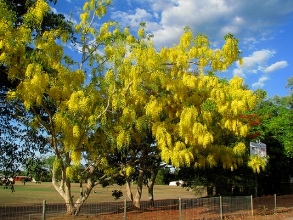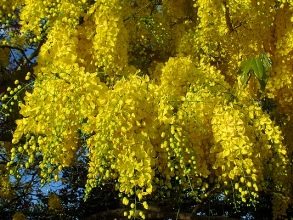 Cassia fistula Tree. Picture courtesy Peter RichardsonGolden Shower trees, are often found growing in many older, mature gardens. They have lost popularity in recent years with more indigenous trees being planted. Young Cassia Fistula trees can still to be found in certain select nurseries, although they are generally regarded to be scarce.
Cassia fistula Tree. Picture courtesy Peter RichardsonGolden Shower trees, are often found growing in many older, mature gardens. They have lost popularity in recent years with more indigenous trees being planted. Young Cassia Fistula trees can still to be found in certain select nurseries, although they are generally regarded to be scarce.
Cassia fistula is native to southern Asia, from southern Pakistan east through India to Myanmar and south to Sri Lanka. It has been spread by man through the Pacific islands and Central and South America. The golden shower tree is the national tree of Thailand, and its flower is Thailand's national flower; symbolising Thai royalty. It is also the state flower of Kerala in India and the flowers are of ritual importance in the Vishu festival.
In Ayurvedic medicine, golden shower tree is known as aragvadha, meaning "disease killer". The root is considered a very strong purgative, and self-medication or any use without medical supervision is strongly advised against in Ayurvedic texts. Recent research has evaluated it for its anti-bacterial properties and as a cough suppressant; as well as for its potential to restrict or protect against nematodes. The wood of Cassia fistula is very durable and is used for construction.
 Cassia fistula Flowers Peter Richardson
Cassia fistula Flowers Peter Richardson
The golden shower has a well-shaped crown and makes a perfect specimen shade tree when isolated on a lawn.
This graceful medium-sized tree grows moderately fast in tropical regions to +-10 to 20m tall. In the garden its ultimate height will vary according to climate and rainfall from +-4 to 12m, with a spread of +-3 to 9m. It is considered semi-evergreen because it generally sheds its leaves for a short period in late winter and spring, just before it blooms. The golden shower tree is a show stopper when in full bloom in spring and summer; producing a profusion of fragrant, pendulous clusters of golden yellow flowers, on naked stems. The flowers are a favourite of bees and butterflies; and the fruit is a long legume filled with several seeds, the seeds are poisonous.
This plant thrives only in the sub-tropical summer rainfall regions of the country. It is slightly salt tolerant and does best if planted in a wind protected position in the garden. The golden shower tree is extremely sensitive to cold and frost, and also struggles in the winter rainfall regions; and in very dry regions. Plant it in full sun and on fertile, sandy or loamy, well-drained soil.
Propagation is by sowing seed in autumn, or root cuttings taken in early summer.


